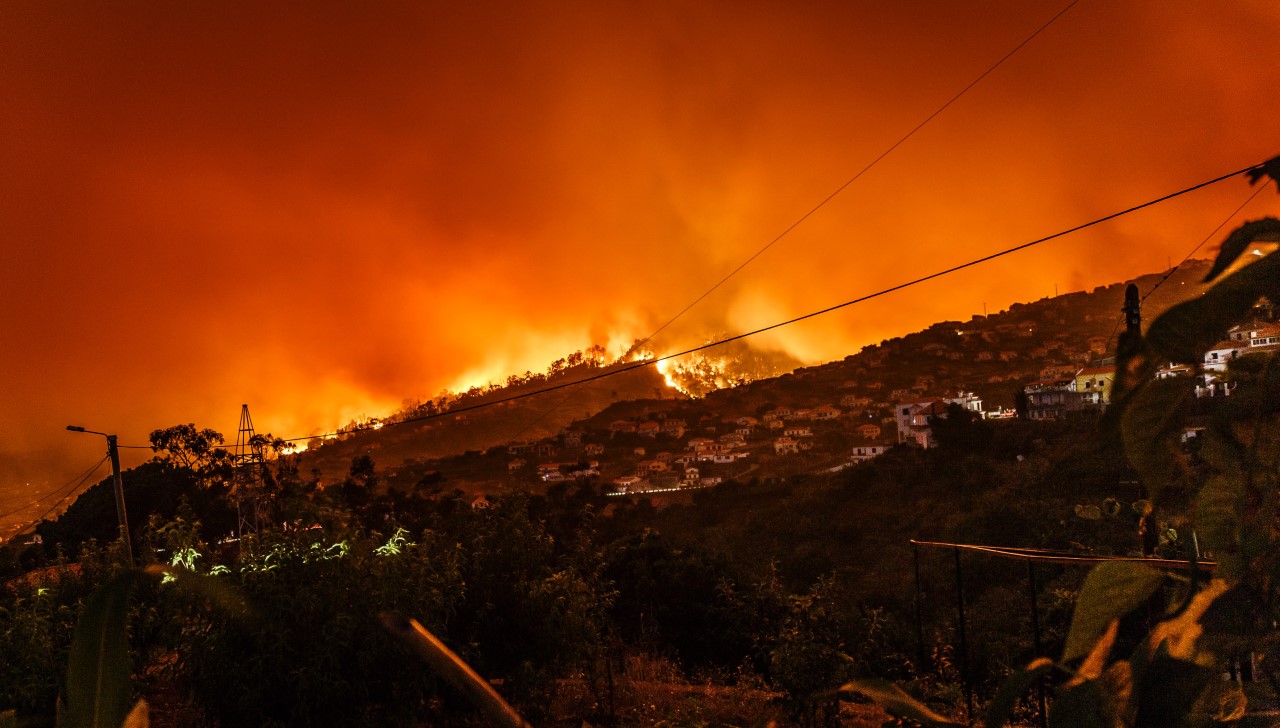The extreme and unprecedented hardships faced worldwide in 2020 and 2021 due to the pandemic cannot be overstated. The COVID-19 pandemic not only wreaked havoc on everyday life but has demonstrated how much of an effect a global disaster can have on different countries. I would argue that one good thing that the pandemic has shown is that the world can and will work together to fight against anything that affects lives globally. The question is whether the world will see climate change in the same light and come together to do the same.
Climate-related weather events are on the rise. Hotter and drier conditions are drying out ecosystems and increasing the risk of wildfires[i]. Anticyclone Lucifer recently swept across Europe bringing hot, dry weather to the continent[ii]. This significantly impacted the lives of people in the south-east of the island of Sicily while fires raged in southern Italy. On the Greek island of Evia, thousands of resin growers have lost their livelihoods due to wildfires that blazed for days. Many residents have been forced to flee their homes and evacuate the island. California continues to experience wildfires while record-breaking wildfires in Siberia have emitted more than 188 megatonnes of carbon, which is equivalent to about 505 megatonnes of carbon dioxide[iii]. In Africa, warmer temperatures are increasing the habitat for transmission of vector-borne diseases, and new diseases are emerging in regions where they were previously not present[iv]. The depletion of water bodies, such as the continued drying-up of the Niger River Basin, has also been attributed to migration and insecurity in some countries in Africa[v]. Judging by the tone of the latest United Nations Intergovernmental Panel on Climate Change (IPCC) report, this is only the beginning[vi].
The IPCC report states in uncategorical terms that emissions of greenhouse gases (GHG) from human activities directly affects more than 70% of the global, ice-free land surface[vii]. It also makes it clear that unless there are immediate, rapid and large-scale reductions in GHG emissions, countries will not meet 1.5ᵒC or 2ᵒC targets in the Paris Agreement[viii].
It is not all bad news though. It is still possible to achieve below 2ᵒC. Urgent action will be needed to rapidly reduce GHG emissions and halt over-exploitation of land resources. These, the report states, would provide a buffer against the negative impacts of climate change on the ecosystem[ix].
197 countries signed up to the Paris Agreement[x] and pledged to work to mitigate and develop adaptive processes aimed at addressing climate issues. However, based on the recent IPCC report, it is clear that a lot more needs to be done both at the global and national levels.
The majority of GHG emissions are from burning fossil fuels like coal, oil and gas for a variety of uses. Energy makes up nearly three-quarters of global emissions, with electricity and heat generation making up the largest emitting sector. Though coal is the most carbon intensive fossil fuel, there are still a large number of operational coal power plants worldwide as of 2021. According to a 2008 study published in Nature, implementation of the Paris Agreement will lead to more divestment from coal and other fossil fuels rather than spark a rush to use up more fossil fuel reserves. A 2019 publication by Climate Analytics found that compatible regional pathways under the Paris Agreement called for peaking coal use for power generation by 2020 with rapid reduction thereafter; with coal phaseout by 2030 in OECD countries, and at least by 2040 in the rest of the world[xi].
Which begs the question – rather than put in place measures to phase-out coal projects, why are some countries ramping up their coal projects[xii]? Finland recently issued a decree on investment aid for projects accelerating the replacement of coal in energy production, with an intention to ban coal projects by 2029[xiii]. This would be one way to take concrete action towards reducing greenhouse gas emissions. This is however easier said than done. Some argue that there are countries that need cheap energy to develop their economies while others need energy security and if coal provides this then why not allow them to use it? There is evidence to suggest that renewables increasingly beat even the cheapest coal projects on cost. Until all countries make the hard decision to phase out fossil fuels and put in place policies to allow for the phasing out of coal (in the first instance) and other fossil fuels (over time) from their energy mix, meeting the commitments under the Paris Agreement will remain a pipe dream.
That being said, it is of critical importance that the developed countries step up to their obligations under the Paris Agreement. Some studies have shown that while developing countries did not contribute significantly to the current climate crisis, the world’s poorest will be the most affected by it. Developing countries need energy to grow their economies and cannot be asked to bear the costs associated with clean technologies. Phasing-out fossil fuel projects will require payment of compensation to the investors/owners being asked to phase out their coal energy production. Overall, funding, technology transfer and cooperation to developing countries will be key to achieving the transition to a clean energy world.
Now to the main challenge I would like to focus on – the role of advisors in fossil fuel projects. There are different entities that have roles to play as part of the advisory process for fossil fuel projects. These include project managers, law firms, technical firms and financial advisory firms. Investment banks, insurance firms and in some cases, governments, public private partnership entities also get involved in such projects.
According to Law Students for Climate Accountability, Vault 100 Firms have supported cases and transactions in the fossil fuel industry. Their Law Firm Climate Change Scorecard ranks the top 100 law firms based on their contribution to the climate crisis and revealed a lot of firms have been found wanting on the sustainability front. I thought it was both interesting and sad that there is an inconsistency in how companies appear to be supporting the sustainable development goals while still carrying on as if it is business as usual. A point to note here, however, is that such projects are not only supported by law firms but by a team of advisors.
The IPCC report outlines the role of institutions in building adaptive and mitigative capacity. Policy makers including organisations such as parliaments, regulatory agencies, private firms and community bodies have critical roles in building adaptive mitigative capacity. To my mind, professional associations should not be excluded from this list.
Professional associations have requirements, including the need for self-governance and independence. These associations put in place professional codes of conduct, to which members must adhere. In a number of countries, membership to professional associations such as the Bar Association, is mandatory or quasi-mandatory[xiv] however there have been questions around the constitutionality of this on the ground of freedom of association. With this in mind, is there a way to put in place rules of conduct or practice specifically aimed at preventing lawyers, financial advisors and engineers from participating or providing certain types of advice to the fossil fuel industry – starting with the construction or expansion of coal fired projects? Can national Bar Associations, International Bar Association and other professional bodies mandate their members to abstain from advising the fossil fuel industry or at the very least limit their advice to matters around ways to phase-out coal projects and providing sustainable alternatives in place of fossil fuel technologies? Would such a mandate even be constitutional? This certainly warrants some thought.
Whatever the case, professional associations have a responsibility to either mandate or encourage their members to consider climate change implications when taking on projects or advising clients.
Considering the nexus between different sustainable development goals, professional associations should consider working together to ensure their members take concrete steps to consider climate change implications and in certain cases refuse to take on projects that clearly run against climate goal objectives.
How would this be implemented in practice? I do not have the answer to this. What I do know is that the climate situation is a clarion call for us all. The question is whether we will heed its call? Change is coming and we need to do what we can to ensure future generations are able to meet their needs as well. As I had stressed at the beginning of this write up, I hope the world will move from apathy to action to collectively support measures needed to slow the causes and effects of climate change with the verve required.
Yomi is a partner with the firm’s Energy and Sustainability practice with a focus on policy, legal and regulatory issues. She can be reached at Oluwayomi.ogedegbe@kairosandsaige.com.
[i] Wildfires and volcanic activities affected 6.2 million people between 1998-2017 with 2400 attributable deaths worldwide from suffocation, injuries, and burns, but the size and frequency of wildfires are growing due to climate change
[ii] https://news.sky.com/story/anticyclone-lucifer-and-heat-domes-why-is-the-world-battling-extreme-weather-12379366
[iii] https://www.space.com/2021-record-wildfire-season-from-space
[iv] https://academic.oup.com/ilarjournal/article/58/3/393/4745724?login=true
[v] https://www.thenewhumanitarian.org/news/2004/04/28/niger-river-action-planned-river-shrinking#:~:text=Droughts%20in%201985%20and%201990,the%20last%20thirty%20years%20alone.
[vi] https://www.ipcc.ch/srccl/chapter/summary-for-policymakers/
[vii]A.1; Human use, at varying intensities, affects about 60–85% of forests and 70–90% of other natural ecosystems (e.g., savannahs, natural grasslands) (high confidence)
[viii] https://www.ipcc.ch/2021/08/09/ar6-wg1-20210809-pr/
[ix] https://www.ipcc.ch/srccl/
[x] https://unfccc.int/process/the-paris-agreement/status-of-ratification
[xi]https://climateanalytics.org/media/key_messages_coal_ca_nycw.pdf
[xii] https://www.reuters.com/article/us-china-coal/chinas-new-coal-power-plant-capacity-in-2020-more-than-three-times-rest-of-worlds-study-idUSKBN2A308U
[xiii] https://valtioneuvosto.fi/en/-/1410877/investment-incentives-to-promote-rapid-phase-out-of-coal-in-energy-production
[xiv] There have been dispute over the constitutionality of mandatory membership in bar associations in the United States and Nigeria – https://www.law.georgetown.edu/georgetown-law-journal/wp-content/uploads/sites/26/2020/04/Levin_The-End-of-Mandatory-State-Bars.pdf; https://www.justice.gov/eoir/page/file/1342141/download
Oluwayomi Ogedegbe| August 19, 2021


Everything is very open with a precise clarification of the challenges. It was really informative. Your website is useful. Thanks for sharing!
Great selection of modern and classic books waiting to be discovered. All free and available in most ereader formats. download free books https://www.philadelphia.edu.jo/library/directors-message-library
Great selection of modern and classic books waiting to be discovered. All free and available in most ereader formats. download free books
whoah this blog is wonderful i really like reading your articles. Keep up the great paintings! You realize, a lot of people are hunting round for this info, you could help them greatly.
https://www.philadelphia.edu.jo/library/directors-message-library
Great Information sharing .. I am very happy to read this article .. thanks for giving us go through info.Fantastic nice. I appreciate this post.